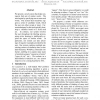Free Online Productivity Tools
i2Speak
i2Symbol
i2OCR
iTex2Img
iWeb2Print
iWeb2Shot
i2Type
iPdf2Split
iPdf2Merge
i2Bopomofo
i2Arabic
i2Style
i2Image
i2PDF
iLatex2Rtf
Sci2ools
108
click to vote
ACL
2010
2010
An Active Learning Approach to Finding Related Terms
We present a novel system that helps nonexperts find sets of similar words. The user begins by specifying one or more seed words. The system then iteratively suggests a series of candidate words, which the user can either accept or reject. Current techniques for this task typically bootstrap a classifier based on a fixed seed set. In contrast, our system involves the user throughout the labeling process, using active learning to intelligently explore the space of similar words. In particular, our system can take advantage of negative examples provided by the user. Our system combines multiple preexisting sources of similarity data (a standard thesaurus, WordNet, contextual similarity), enabling it to capture many types of similarity groups ("synonyms of crash," "types of car," etc.). We evaluate on a hand-labeled evaluation set; our system improves over a strong baseline by 36%.
Related Content
| Added | 10 Feb 2011 |
| Updated | 10 Feb 2011 |
| Type | Journal |
| Year | 2010 |
| Where | ACL |
| Authors | David Vickrey, Oscar Kipersztok, Daphne Koller |
Comments (0)

